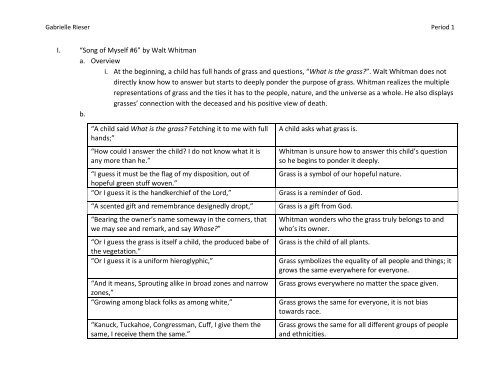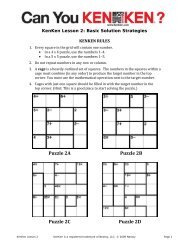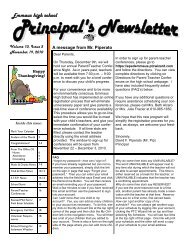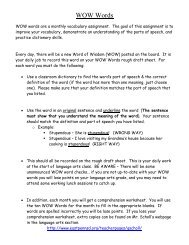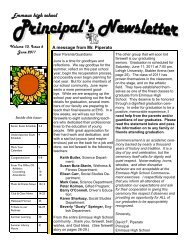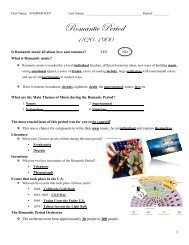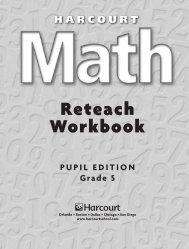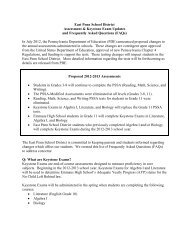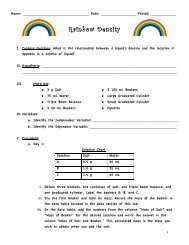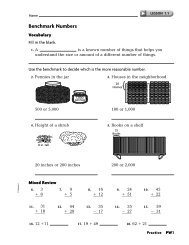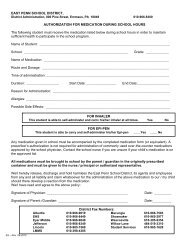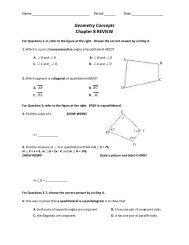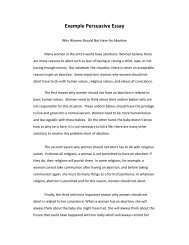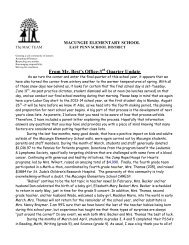I. âSong of Myself #6â by Walt Whitman a. Overview i. At the ...
I. âSong of Myself #6â by Walt Whitman a. Overview i. At the ...
I. âSong of Myself #6â by Walt Whitman a. Overview i. At the ...
You also want an ePaper? Increase the reach of your titles
YUMPU automatically turns print PDFs into web optimized ePapers that Google loves.
Gabrielle Rieser Period 1<br />
I. “Song <strong>of</strong> <strong>Myself</strong> #6” <strong>by</strong> <strong>Walt</strong> <strong>Whitman</strong><br />
a. <strong>Overview</strong><br />
i. <strong>At</strong> <strong>the</strong> beginning, a child has full hands <strong>of</strong> grass and questions, “What is <strong>the</strong> grass?”. <strong>Walt</strong> <strong>Whitman</strong> does not<br />
directly know how to answer but starts to deeply ponder <strong>the</strong> purpose <strong>of</strong> grass. <strong>Whitman</strong> realizes <strong>the</strong> multiple<br />
representations <strong>of</strong> grass and <strong>the</strong> ties it has to <strong>the</strong> people, nature, and <strong>the</strong> universe as a whole. He also displays<br />
grasses’ connection with <strong>the</strong> deceased and his positive view <strong>of</strong> death.<br />
b.<br />
“A child said What is <strong>the</strong> grass? Fetching it to me with full<br />
hands;”<br />
“How could I answer <strong>the</strong> child? I do not know what it is<br />
any more than he.”<br />
“I guess it must be <strong>the</strong> flag <strong>of</strong> my disposition, out <strong>of</strong><br />
hopeful green stuff woven.”<br />
“Or I guess it is <strong>the</strong> handkerchief <strong>of</strong> <strong>the</strong> Lord,”<br />
A child asks what grass is.<br />
<strong>Whitman</strong> is unsure how to answer this child’s question<br />
so he begins to ponder it deeply.<br />
Grass is a symbol <strong>of</strong> our hopeful nature.<br />
Grass is a reminder <strong>of</strong> God.<br />
“A scented gift and remembrance designedly dropt,” Grass is a gift from God.<br />
“Bearing <strong>the</strong> owner’s name someway in <strong>the</strong> corners, that<br />
we may see and remark, and say Whose?”<br />
“Or I guess <strong>the</strong> grass is itself a child, <strong>the</strong> produced babe <strong>of</strong><br />
<strong>the</strong> vegetation.”<br />
“Or I guess it is a uniform hieroglyphic,”<br />
“And it means, Sprouting alike in broad zones and narrow<br />
zones,”<br />
“Growing among black folks as among white,”<br />
“Kanuck, Tuckahoe, Congressman, Cuff, I give <strong>the</strong>m <strong>the</strong><br />
same, I receive <strong>the</strong>m <strong>the</strong> same.”<br />
<strong>Whitman</strong> wonders who <strong>the</strong> grass truly belongs to and<br />
who’s its owner.<br />
Grass is <strong>the</strong> child <strong>of</strong> all plants.<br />
Grass symbolizes <strong>the</strong> equality <strong>of</strong> all people and things; it<br />
grows <strong>the</strong> same everywhere for everyone.<br />
Grass grows everywhere no matter <strong>the</strong> space given.<br />
Grass grows <strong>the</strong> same for everyone, it is not bias<br />
towards race.<br />
Grass grows <strong>the</strong> same for all different groups <strong>of</strong> people<br />
and ethnicities.
Gabrielle Rieser Period 1<br />
“And now it seems to me <strong>the</strong> beautiful uncut hair <strong>of</strong><br />
graves.”<br />
“Tenderly will I use you curling grass,”<br />
“It may be you transpire from <strong>the</strong> breasts <strong>of</strong> young men,”<br />
“It may be if I had known <strong>the</strong>m I would have loved <strong>the</strong>m,”<br />
“It may be you are from old people, or from <strong>of</strong>fspring<br />
taken soon out <strong>of</strong> <strong>the</strong>ir mo<strong>the</strong>rs’ laps,”<br />
“And here you are <strong>the</strong> mo<strong>the</strong>rs’ laps.”<br />
“The grass is very dark to be from <strong>the</strong> white heads <strong>of</strong> old<br />
mo<strong>the</strong>rs,”<br />
“Darker than <strong>the</strong> colorless beards <strong>of</strong> old men,”<br />
“Dark to come from under <strong>the</strong> faint red ro<strong>of</strong>s <strong>of</strong> mouths.”<br />
Grass grows from <strong>the</strong> graves beneath <strong>the</strong> ground and<br />
represents <strong>the</strong> dead.<br />
He will treat <strong>the</strong> grass carefully and respectfully since it<br />
comes from those who have passed away.<br />
Grass may grow from <strong>the</strong> grave <strong>of</strong> young men.<br />
Perhaps if he had met <strong>the</strong> people in <strong>the</strong>se graves, he<br />
could have grown to love <strong>the</strong>m.<br />
<strong>Whitman</strong> displays <strong>the</strong> unknown <strong>of</strong> who lies within <strong>the</strong>se<br />
graves, could be <strong>the</strong> old or <strong>the</strong> very young.<br />
Grass could also grow from <strong>the</strong> laps <strong>of</strong> mo<strong>the</strong>rs.<br />
Compares <strong>the</strong> grass’ dark color to <strong>the</strong> white hair <strong>of</strong> <strong>the</strong><br />
old mo<strong>the</strong>rs that could be in <strong>the</strong> graves.<br />
Compares <strong>the</strong> grass’ darkness to <strong>the</strong> white hair <strong>of</strong> <strong>the</strong><br />
old men that could be in <strong>the</strong> graves.<br />
Since grass comes from <strong>the</strong> mouths <strong>of</strong> <strong>the</strong> dead,<br />
<strong>Whitman</strong> compares <strong>the</strong> grass’ dark color to <strong>the</strong> redness<br />
<strong>of</strong> <strong>the</strong> dead people’s mouths.<br />
“O I perceive after all so many uttering tongues,” Grass comes from <strong>the</strong> mouths <strong>of</strong> dead people like<br />
tongues.<br />
“And I perceive <strong>the</strong>y do not come from <strong>the</strong> ro<strong>of</strong>s <strong>of</strong><br />
mouths for nothing.”<br />
“I wish I could translate <strong>the</strong> hints about <strong>the</strong> dead young<br />
men and women,”<br />
“And <strong>the</strong> hints about old men and mo<strong>the</strong>rs, and <strong>the</strong><br />
<strong>of</strong>fspring taken soon out <strong>of</strong> <strong>the</strong>ir laps.”<br />
<strong>Whitman</strong> believes <strong>the</strong>re is an explanation as to why<br />
grass comes from <strong>the</strong> mouths <strong>of</strong> <strong>the</strong> dead.<br />
He wishes he could speak to <strong>the</strong> people in <strong>the</strong> graves<br />
and understand <strong>the</strong>m.<br />
<strong>Whitman</strong> is once again showing <strong>the</strong> variety <strong>of</strong> people
Gabrielle Rieser Period 1<br />
“What do you think has become <strong>of</strong> <strong>the</strong> young and old<br />
men?”<br />
“And what do you think has become <strong>of</strong> <strong>the</strong> women and<br />
children?”<br />
“They are alive and well somewhere,”<br />
“The smallest sprout shows <strong>the</strong>re is really no death,”<br />
“And if ever <strong>the</strong>re was it led forward life, and does not<br />
wait at <strong>the</strong> end to arrest it,”<br />
“And ceas’d <strong>the</strong> moment life appear’d.”<br />
“All goes onward and outward, nothing collapses,”<br />
“And to die is different from what any one supposed, and<br />
luckier.”<br />
who could be in <strong>the</strong> graves.<br />
He wonders where <strong>the</strong> young and old men are and what<br />
<strong>the</strong>y are doing (wondering if afterlife exists).<br />
He wonders where <strong>the</strong> women and children are and<br />
what <strong>the</strong>y are doing (wondering if afterlife exists).<br />
He believes <strong>the</strong> dead are still a part <strong>of</strong> our universe.<br />
The fact that grass grows from <strong>the</strong> dead shows that<br />
death does not exist and that even from death comes<br />
life.<br />
Although, if death does exist, it does not end life but it<br />
leads life forward.<br />
The moment a life ends is also <strong>the</strong> moment ano<strong>the</strong>r life<br />
begins.<br />
Life goes on.<br />
<strong>Whitman</strong> expresses his positive view <strong>of</strong> death and his<br />
belief that death is not as bad as it seems.<br />
c. Literary devices<br />
i. Symbolization- used to show grass’ relation to people, nature, and <strong>the</strong> universe.<br />
1. “Or I guess it is <strong>the</strong> handkerchief <strong>of</strong> <strong>the</strong> Lord,”<br />
2. “Or I guess <strong>the</strong> grass is itself a child, <strong>the</strong> produced babe <strong>of</strong> <strong>the</strong> vegetation.”<br />
3. “Or I guess it is a uniform hieroglyphic,”<br />
4. “And now it seems to me <strong>the</strong> beautiful uncut hair <strong>of</strong> graves.”<br />
ii. Allusion- used to convey <strong>the</strong> idea <strong>of</strong> diversity using examples <strong>of</strong> different groups.<br />
1. “Kanuck, Tuckahoe, Congressman, Cuff, I give <strong>the</strong>m <strong>the</strong> same, I receive <strong>the</strong>m <strong>the</strong> same.”
Gabrielle Rieser Period 1<br />
iii. Imagery- used to create a mental picture in <strong>the</strong> mind <strong>of</strong> a reader.<br />
1. “Dark to come from under <strong>the</strong> faint red ro<strong>of</strong>s <strong>of</strong> mouths.”<br />
iv. Parallel Structure- creates a satisfying rhythm used to emphasize key points in a poem.<br />
1. “It may be you transpire from <strong>the</strong> breasts <strong>of</strong> young men,<br />
It may be if I had known <strong>the</strong>m I would have loved <strong>the</strong>m,<br />
It may be you are from old people, or from <strong>of</strong>fspring taken soon out <strong>of</strong> <strong>the</strong>ir mo<strong>the</strong>rs’ laps,”<br />
v. Repetition- reiterates a certain point to draw emphasis.<br />
1. “The grass is very dark to be from <strong>the</strong> white heads <strong>of</strong> old mo<strong>the</strong>rs,<br />
Darker than <strong>the</strong> colorless beards <strong>of</strong> old men,<br />
Dark to come from under <strong>the</strong> faint red ro<strong>of</strong>s <strong>of</strong> mouths.”<br />
vi. Alliteration- used to call attention to a set <strong>of</strong> words or make a sentence smoo<strong>the</strong>r.<br />
1. “The smallest sprout shows <strong>the</strong>re is really no death,”<br />
d. Tone<br />
i. Hopeful and optimistic attitude is shown. <strong>Walt</strong> <strong>Whitman</strong> displays his positive view <strong>of</strong> death so <strong>the</strong>re is no<br />
sense <strong>of</strong> sorrow or idea <strong>of</strong> mourning. Instead, <strong>Whitman</strong> is just curious <strong>of</strong> <strong>the</strong> lives <strong>of</strong> <strong>the</strong> deceased and wishes<br />
he could have known <strong>the</strong>m.<br />
e. Theme<br />
i. The positive view <strong>of</strong> death and <strong>the</strong> idea that perhaps it is not as bad as people believe it to be. That even in <strong>the</strong><br />
event <strong>of</strong> a death, life goes on and that person will still be alive and well in some part <strong>of</strong> <strong>the</strong> universe. There is<br />
also a <strong>the</strong>me <strong>of</strong> diversity in age, gender, and race.<br />
f. Citations<br />
i. "Section 6 Summary." Song <strong>of</strong> <strong>Myself</strong>. Shmoop, n.d. Web. 10 Dec. 2012.<br />
.<br />
ii. Vijaen1919. "Critical Analysis <strong>of</strong> <strong>Walt</strong> <strong>Whitman</strong> Song <strong>of</strong> <strong>Myself</strong>." Scribd. N.p., n.d. Web. 11 Dec. 2012.<br />
.


